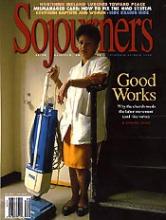CHARITABLE CHOICE HAS little to do with choice and even less with charity. Melissa Rogers ("Threat to Religion," July-August 1998) provides a good list of reasons for opposing this government scheme to avoid responsibility and shift focus from the causes of the problems in our communities. I have even more practical concerns.
Early experience with "workfare"-type requirements gives some idea of what is in store. When approached about supervising workers at our church, I said I would like six people that I could send out each day for a permanent picket line protesting workfare. I was told that I didn't have that "choice," or many others. I didn't take any workers.
I have no desire to enforce policies that I had no part in formulating. I do not want to be known as "the church that kicks people off welfare." I will not participate in distributing benefits that are inadequate and will be diminishing. I want people to be clear about who the church is and who the government is. I want to be able to raise questions about the causes of poverty in my community. In this war against the poor, churches should be conscientious objectors, if not resisters.
Perhaps I would be more interested if I was given greater "choice" in what programs my church could administer. Being in charge of parking tickets could be fun, real estate development policy or taxation could be real opportunities for ministry, but apparently "charities" will not be given that "choice."
Read the Full Article
